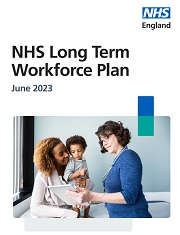Technologies such as AI and machine learning will be crucial to the successful delivery of the NHS’s newly-published Long Term Workforce Plan, healthtech leaders have claimed.
Unveiled in the run-up to yesterday’s celebration of the NHS’s 75th anniversary, the plan sets out how the NHS will address existing vacancies and meet the challenges of a growing and ageing population by recruiting and retaining hundreds of thousands more staff over 15 years and working in new ways.
Described as a ‘once in a generation opportunity to put staffing on a sustainable footing and improve patient care’, the document focuses on retaining existing talent and making the best use of new technology, alongside the biggest recruitment drive in health service history.
It was commissioned and accepted by the Government, which has backed the plan with over £2.4billion to finance additional education and training places over five years on top of existing funding commitments.
Retention and recruitment
And the plan aims to reduce reliance on expensive agency spend that could cut the bill for taxpayers by around £10billion between 2030/31 and 2036/37.
Taken with retention measures, the move could mean the health service has at least an extra 60,000 doctors, 170,000 more nurses, and 71,000 more allied health professionals in place by 2036/37.
The plan’s acceptance of the key role technology will play in the success of the proposals has been widely welcomed by industry leaders.
In particular, a commitment to harnessing advances in AI has been lauded, with proposals for an expert group to be set up to identify advanced technology that could be best used across the country.
This is really exciting because it shows that the Government recognises the role that technology plays in improving efficiency within the health industry
Health and Social Care Secretary, Steve Barclay, said: “The NHS Long Term Workforce Plan, backed by significant government investment, shows our determination to support and grow the workforce.
“It sets out how we will deliver the biggest expansion of staff training in NHS history, retain more talented people, and harness cutting-edge technology.”
The role of technology
 Matthew Taylor, chief executive of the NHS Confederation, added: “The Government should be commended for backing NHS England to produce a thorough, bold, and ambitious plan – one that has taken on board much of what the wider NHS has been asking for.
Matthew Taylor, chief executive of the NHS Confederation, added: “The Government should be commended for backing NHS England to produce a thorough, bold, and ambitious plan – one that has taken on board much of what the wider NHS has been asking for.
“We see this plan as the crucial first leg in a three-legged stool that the NHS needs to revive and thrive – the other two being an equivalent plan for the social care workforce, alongside extra investment in capital and technology.
“Both will be required to achieve the plan’s laudable ambitions, particularly when it comes to the level of productivity increases that are envisaged.”
The Health Tech Alliance is an informal coalition of healthtech companies working to drive up the adoption of technologies, devices, and diagnostics that are proven to benefit patient outcomes and deliver cost savings to the NHS.
And it is hoping to engage with the Government moving forward to ensure tech adoption is central to the proposals.
Ellie Kearney, the group’s director of external affairs, told BBH: “The plan details greater use of tech within the NHS to free up time, increase flexibility, and provide care for patients more effectively.
Moving forward
“This is really exciting because it shows that the Government recognises the role that technology plays in improving efficiency within the health industry.
“We look forward to engaging with the Government on this plan and exploring how the healthtech industry can support the workforce in the coming years.”
Healthtech companies have also welcomed the focus on technology within the plan. But they have warned that proper funding and training is necessary, as well as support across the system.
Read on to find out more.
Looking forward, we believe that the best way to maximise digitisation is to look at it from a care continuum perspective rather than an individual provider perspective
Steve Sawyer, managing director of The Access Group
“Technology has the potential to bridge the gaps in our healthcare service delivery and tackle the logistical friction that is currently experienced.
“It can help automate and integrate the assessment of patient needs, equipment provision, and care co-ordination – all in a single digital platform.
“The result would be a more-dynamic, efficient, and patient-centric process, enhancing the value we get from digitisation.
“Looking forward, we believe that the best way to maximise digitisation is to look at it from a care continuum perspective rather than an individual provider perspective, which is why the digital strategies for the Integrated Care Systems and Integrated Care Boards are so important, and reinforces why ICSs in particular will play such a crucial role.”
Convincing the workforce of the benefits of technology has not always been easy, so it is imperative, now more than ever, to show how it can make their lives easier as we undertake the most-substantial transformation of the workforce we have ever seen
Rachael Fox, executive vice president EMEA at Altera Digital Health
“I expect we should be delighted that there will be a further 301,000 healthcare professionals in the NHS by 2037, but I’m concerned that the focus on increasing capacity will eclipse an even-more-important priority: retention.
“We already struggle to support our existing workforce, with many staff experiencing burnout and choosing to leave the profession, which has resulted in 112,000 existing vacancies.
“The role that technology plays in alleviating this burnout should not be underestimated.
“We’ve seen it having an impact at NHS organisations all over the country.
“At Gloucestershire Hospitals NHS Foundation Trust, technology has helped to reduce time spent on administrative tasks by 25%, while, at Bolton NHS Foundation Trust, it has reduced length of stay by 19%. This type of impact is exactly what the plan is asking for.
“In its 75-year history, the NHS has never been short of challenges. But, right now, the workforce is at breaking point.
“As a clinical systems provider, it is our responsibility to make life as easy as possible for staff, complimenting and enhancing their ways of working.
“Convincing the workforce of the benefits of technology has not always been easy, with it being considered a source of burnout itself in some cases. So it is imperative, now more than ever, to show how it can make their lives easier as we undertake the most-substantial transformation of the workforce we have ever seen.”
While automation can help bridge some of the workforce gap, I would urge healthcare providers and policymakers to focus on improving patient-facing technology which puts the patient in control of their place in the queue
Richard Pugmire, director of Answer Digital
“Innovative technology, and in particular AI, are changing the nature of healthcare.
“However, it is not a silver bullet.
“While AI technology can automate appointment bookings and help with triaging the 7.4 million people on the elective waiting list, what it cannot do is augment a lack of frontline staff and inadequate resources for treating everyone who needs it.
“The headlines of the Long-term Workforce Plan are positive, but I fear we need to be realistic in understanding the benefits of the additional funding and recruitment will take several years to filter through.
“While automation can help bridge some of the workforce gap, I would urge healthcare providers and policymakers to focus on improving patient-facing technology which puts the patient in control of their place in the queue, within closely monitored parameters.
“And, with regards to diagnostics, we’ve seen a proliferation of AI use cases, particularly in the last two years.
“The endeavour and innovation we are seeing to progress AI in this area is really encouraging, particularly with regards to prioritising workloads in radiology, digital pathology, and genomics.
“Deploying AI in these areas requires very-specialist and highly-regulated models and complex integration workflows. As well as continuing to invest in the NHS workforce, we need to lower the barriers to deploying clinical AI so we can speed up the transformation of patient pathways.
“One of the ways of doing this is through deploying an AI deployment engine which can allow healthcare providers to deploy AI models safely, effectively, and efficiently by enabling the integration of AI models into clinical workflows which feed patient records.”
Together with the NHS, technology providers must pay attention to ensure their systems are user friendly and easy to learn, which will play a vital role in helping newly-trained healthcare professionals in their initial positions, especially if degree programmes are shortened as proposed
Adrian Aggett, client director at Better UK and Ireland
“Doctors and nurses are used to changing and improving the way they work, often driven by technological advancements in healthcare.
“Together with the NHS, technology providers must pay attention to ensure their systems are user friendly and easy to learn, which will play a vital role in helping newly-trained healthcare professionals in their initial positions, especially if degree programmes are shortened as proposed.
“At Better, we take our responsibility in bridging the gap between academia and clinical practice seriously. Through our free Better Meds education programme, which will be live across seven universities by the end of 2023, we will work with experienced lecturers and professors to train students in prescribing, reviewing, and administering medicines electronically – with the same tools they will use in the future, thus providing them with valuable experience and reducing stress and cognitive burden in their early careers.”
Given the shortage of healthcare professionals in the NHS now, it is imperative to prioritise the development and implementation of AI for cancer which can reduce the workload on staff and support administrative tasks
Paul Landau, chief executive of Careology
 “The Government is right to be investing in AI, virtual wards, and moving towards more-personalised care to support patients to manage their own health.
“The Government is right to be investing in AI, virtual wards, and moving towards more-personalised care to support patients to manage their own health.
“We know this is what people living with cancer want. However, given the shortage of healthcare professionals in the NHS now, it is imperative to prioritise the development and implementation of AI for cancer which can reduce the workload on staff and support administrative tasks.
“We also need to put patients’ experiences of cancer treatment at the centre of pathway design and prioritise areas for improvement with a dedicated cancer plan.
“This is the only way we can address the current inequalities in cancer provision and access to treatment.”
The plan confirms that technology should be embedded in clinical practices, and is key to improved workforce productivity, but digital education should begin far before staff enter their clinical environment
Dr Rachael Grimaldi, co-founder and chief executive of CardMedic
“The plan confirms that technology should be embedded in clinical practices, and is key to improved workforce productivity, but digital education should begin far before staff enter their clinical environment.
“It’s something many of our customers have been advocating for some time – embracing, using, and innovating with digital tools should be on the curriculum.
“That said, it is promising to see that this plan will be revisited every two years.
“Undoubtedly, there will be new challenges that come, that require new approaches, and flexibility will be incredibly important as we manage this incredible change.”
The focus should be on finding a balance between embracing new technologies and leveraging the value of existing ones, where tech is the golden thread that patients can follow across the increasingly-complex world of healthcare
Craig Oates, managing director at Doctrin UK
“While we commend the current plan’s welcome emphasis on workforce expansion and the use of tech as a catalyst for the care, we believe that it doesn’t go far enough in tackling the current, ongoing, and future workforce shortages and challenges.
“Amidst the pressure and stress care staff are under, and the impact that has on access to care and the capacity to deliver quality care to those who need it, this is a serious concern that demands a stronger, more-resilient approach.
“While it is promising to see AI and other ‘trendy’ tech being highlighted, they are still developing and maturing their governance and identifying any areas of weakness or clinical risk.
“We believe the focus on these shiny new innovations has caused us to overlook the proven benefits of existing and proven innovative technologies and the need for these to be combined with transforming how and where care is delivered.
“For instance, tech doesn’t just automate access and bookings, it validates the traffic and determines who the patient should be seen by, to get the right treatment from the outset, diverting and deflecting to other more-appropriate services and self care, releasing capacity for healthcare teams to focus on those patients who need their skills and expertise most.
“Let’s not forget that tech is a tool to aid, not replace, our workforce.
“The focus should be on finding a balance between embracing new technologies and leveraging the value of existing ones, where tech is the golden thread that patients can follow across the increasingly-complex world of healthcare.”
By harnessing the power of automation technologies, the NHS can streamline administrative processes, increase efficiency, and ultimately improve patient outcomes
Louise Wall, managing director of E18Innovation
“There is a need to transform the way the NHS currently operates, and while the plan seems to take the right steps in terms of increasing the training of NHS staff, it does not go far enough in emphasising how digital solutions can support our staff.
“The use of robotic process automation to schedule appointments and operations, alongside the use of AI software to transcribe doctors’ notes, is just the tip of the iceberg.
“By harnessing the power of automation technologies, the NHS can streamline administrative processes, increase efficiency, and ultimately improve patient outcomes.
“We need to empower healthcare professionals with digital tools, while focusing on training new staff, retaining current staff, and using automation to fill gaps to improve the workplace for the workforce.”
It is imperative that the workforce has the right tools in place, paired with the confidence and knowledge to use technology if the reform ambitions are to be achieved
Kenny Bloxham, director at Healthcare Communications
 “It’s welcome to see additional funding and an ambitious recruitment drive outlined in the Long-Term Workforce Plan, in addition to the acknowledgement that digital innovations will play in the workforce reforms.
“It’s welcome to see additional funding and an ambitious recruitment drive outlined in the Long-Term Workforce Plan, in addition to the acknowledgement that digital innovations will play in the workforce reforms.
“As it stands, there are a record 7.4 million people on waiting lists for treatment and I expect this will grow until the benefits of this plan filter through, which could take several years.
“If we are to maximise productivity, speed up care, and cut waiting lists, effective and enhanced patient communications solutions must be widely implemented.
“Above all, it is imperative that the workforce has the right tools in place, paired with the confidence and knowledge to use technology if the reform ambitions are to be achieved.”
Kieran Hughes, president for Europe at Nordic Consulting
“The plan rightly mentions the need to upskill the workforce to unlock the potential of technology to deliver ‘the care of the future’, but we need to think about how this will happen.
“To efficiently and rapidly address the lack of skilled professionals experienced in implementing culture change for successful transformation projects, the NHS should consider adopting a shared service approach. This will enable us to quickly establish the digital workforce needed, especially for specialised skills like data and analytics.
“But, to really increase NHS productivity, we need to recognise that there isn’t a single solution that will fix everything.
“This workforce plan is essential, but we also desperately need investment in capital infrastructure, with a critical focus on digital infrastructure.
“AI, data, and digital technology will enable radical changes to services over the next decade, but like other sectors of the economy, this transformation needs investment.”
